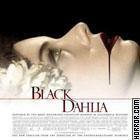The Black Dahlia
What horror fan doesn't know the cinematic stylings of Brian De Palma? From the quirky Sisters (1973), to the seminal Carrie (1976), to the drill-kill of Body Double (1984), we've thrilled and chilled to his masterful movies.
De Palma also knows noir — this is particularly evident in Dressed to Kill (1980) and The Untouchables (1987). Of course, he also directed critically acclaimed fare such as Scarface (1983) and Carlito's Way (1993). Seems he'd be the perfect auteur to bring the characters of James Ellroy's hardboiled novel of the same name from page to screen.
So… Is he? I had mixed reactions to The Black Dahlia (2006), but overall I do recommend the film. The subject matter is beyond reproach — in a 1947 case that remains unsolved to this day and continues to fascinate gumshoes and average Joes alike, Elizabeth "The Black Dahlia" Short, an aspiring actress, was brutally murdered in Hollywood.
The details of her killing still sicken, even today. She was found in a vacant lot, naked and bruised, severed at the waist. Legs broken, female organs savaged, head crushed, and her face slashed to wear an ear-to-ear grin. In the days when dead bodies were shown in tabloids every day, the image of her cadaver was withheld from the public.
The Black Dahlia is close to Ellroy's novel, so you will have to expect a lot of fictional characters and their trials and tribulations — Elizabeth Short is the catalyst, but if you are looking for a biopic about her, this is not it.
In the movie,
What is not so excellent is the casting of some of the other leads. I can't fault Josh Hartnett's acting for even a second, but he seems miscast as Bucky Bleichert, a puglist/police detective on the murder beat. I didn't buy him as a boxer, or as a brooding shamus. There are some voiceovers, in true noir fashion, but his timbre does not hold the same gravitas as a Bogart (The Maltese Falcon), a Holden (Sunset Blvd.), or an O'Brien (D.O.A.) and his manner just didn't fit his rumpled suit.
Another actor who can usually always act and looks amazing in any time-period, is Scarlett Johansson. She plays Kay, a woman with a dark past who is fighting her attraction to Bucky because she lives with Bucky's partner, Lee Blanchard (Aaron Eckhart). She is gorgeous in the movie, but throughout much of it she looks ill at ease in Kay's skin (if she was trying to project that Kay herself was ill at ease, it didn't work).
Finally Fiona Shaw, as a high-society dame who may or may not have a connection to the murder case, is so far over the top she veers into high camp. Her strange expression (a permanent tragedy mask) is carried too far alone, but just wait until she walks and talks. It's almost funny. Almost. Luckily, De Palma's movie never does elicit unintentional laughs (in fact, there is one scene involving Shaw that is supposed to be very dark comedy, and it works). But a few eyebrows will surely be raised.
As for the rest of the cast, they are superb. Hilary Swank, who's best-known for her boyish roles (Boys Don't Cry, Million Dollar Baby), is picture-perfect as the duplicitous, oversexed femme fetale. She looks dazzling, her vamp voice is pitch-perfect, and her mannerisms are all spot-on.
Another actor who is totally at home in his tightrope of a role is Eckhart. I believed him every time he was onscreen, but sadly the size of his role is not equal to Hartnett's. He has to play a boxer, a cop, a lover, an obsessed vigilante, and a troubled speed-freak. Eckhart sells each and every aspect of his complex character to precision.
Did I say "complex"? Yes, The Black Dahlia is a very complex film. Overly so. True enough, it is based on a book that's even more layered and multifarious, but the movie feels overstuffed and is certainly hurried at the end. De Palma's detractors certainly can't blame him for choosing style over substance here, because there is a lot of story to contend with.
Still, De Palma manages to keep the plot boiling and he's ably aided by a sublime crew — legendary cinematographer Vilmos Zsigmond, costumer Jenny Beavan, and production designer Dante Ferretti — who all make The Black Dahlia look like a Grade-A modern noir.
Bringing to mind the famous Frankie Goes To Hollywood scene in Body Double, The Black Dahlia gives us crooning in a swanky lesbians-only cabaret by k.d. lang. Dressed in a natty men's suit Marlene Dietrich would have coveted, lang sultrily sings Love For Sale amid a cluster of fawning chorines. There are a lot of great little touches like that throughout the film — it's fun to watch.
While The Black Dahlia is a pretty mixed bag and could have used some more judicious editing, it's still worth a look for anyone who's interested in this gruesome murder case and Ellroy's fantastical finale.
= = =
Reviewed by Staci Layne Wilson



